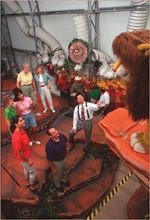Brand Loyalty: Applying Disney’s Formula for Long-Lasting Success
Few global brands can boast the kind of passion and loyalty that generations of Disney fans feel for their beloved Mickey Mouse and his creator, Walt Disney.
Few global brands can boast the kind of passion and loyalty that generations of Disney fans feel for their beloved Mickey Mouse and his creator, Walt Disney. The question on the minds of business leaders is: How does Disney do it? How does this family entertainment company maintain its worldwide appeal while consistently producing strong business results?
At Disney Institute, we train business leaders, including long-term care executives, to recognize the power of building and nurturing a consistent brand – one that allows an organization to sustain lifelong relationships with its customers. Disney works hard to sustain lifelong relationships with guests, continually expanding product and service offerings and maintaining the integrity of one of the world’s most recognizable brands.
But it takes more than simply building a brand to build brand loyalty. The key, really, is in understanding the emotional connection that customers have with the brands and products they love, and then, most importantly, respecting and cultivating that connection.
The Emotional Connection

Successful organizations understand that strengthening the connection between their brand, their employees, and their customers will promote financial success. Going further, by building personal relationships based on authenticity and trust, companies can develop levels of commitment that lead to sustained growth and success. It's important to recognize that while customer loyalty is primarily defined by what people do (return and re-purchase), brand loyalty is defined by how people feel.
Walt Disney recognized that, above everything else, brand loyalty begins with an authentic relationship. Walt determined from the start that, in the park, we would treat people not as just another paying customer, but as "guests in our own home." He knew that if our guests understood and believed that everyone in the organization cared about them and their business, they would be loyal to Disney forever. That philosophy continues to this day. Whether guests are visiting a Disney theme park or watching a Disney movie, they expect not just to be entertained and amazed, but also to feel special – as though the story were meant for them. That's the emotional connection at work.
The personal contacts and relationships consumers experience when shopping, purchasing or using your product can make or break your brand. There are many reasons why customers abandon their relationship with a company, but the customer's perception that the business didn't care is almost always listed at the top of the list.
Now, I'm sure at this point you are thinking, "Yes, but you're Disney. It's easy for you to create an emotional connection to your brand." In many ways, you are right. We have a unique company that produces unique products and stories that people love. But it doesn't have to be that way. There are parks around the world that spend a lot of time and money developing top-notch rides and attractions, but still struggle with the overall customer experience.
We pride ourselves in creating a truly entertaining experience for everybody. We do that by considering how the entire system works together; the product, the people, and the story – the story of the attraction or film certainly, but also the story told by people after leaving. Stories are the manifestation of the brand and people tell stories.
Employees as Emotional Engines
Disney theme parks receive thousands of guest letters and emails every year detailing not what attractions they loved, but the positive interactions they had with our cast members (Disney-speak for employees). Truly, it's our cast members who distinguish us from our competitors, and what keeps our guests loyal to our brand.

Some of these magical moments are orchestrated and executed on a daily basis in our theme parks and resorts worldwide. Others are truly spur-of-the-moment. When cast members see an opportunity to make a difference in the guests' experience, they do so. Here are just a few examples of the opportunities we provide cast members in order to create magical moments for our guests:
- Guest of the day programs
- Honorary titles, badges and certificates
- Special scavenger hunts
- Honorary starring roles in our shows
- Special games and activities just for children
- Signed cards from Disney characters
For Disney cast members, nothing is more important to them than the guest experience.
Positive interactions, no matter how small, delivered consistently and sincerely on a personal level, result in lasting memories and an emotional connection to the brand.
Now think about your own organization. What opportunities do you have to create magical moments for your guests? How can you or your employees go above and beyond to connect emotionally with that guest and/or his family?
Building Repeat Business
As mentioned previously, it costs much less to retain a customer than to find a new one. Customers who love what you sell keep coming back to buy and sample new products and services. These customers are the bread and butter of any organization, and the base upon which a business can grow. With this solid base, companies can then shift limited resources from acquisition marketing to reintroducing and reinforcing the brand in support of a growing army of advocates.
Strategies around corporate responsibility and community relations can help to reinforce and extend the brand by connecting with customers' underlying values. Continuous market research efforts help us to understand where, when, and to whom we might reintroduce the brand. And, by continually reaching out to our audiences in new and creative ways, we increase the likelihood that they will introduce us to others who may not yet know us as well.
We have found that many organizations, including long-term care facilities, can feel overwhelmed by the challenges of conducting continual research and dealing with some of the potentially negative feedback that comes with the territory. But this feedback is critical for the long-term health of your business, and will demonstrate a high level of commitment to your customers and to your team.
Take, for example, Disney cast members. There are few people in the world who are as critical of Disney products and services as Disney cast members. That's not because they are unhappy in their jobs – it’s because they love the company and want to make sure we are producing only the very best for our guests. This is why when a new Disney Cruise Line ship premieres, or a new theme park opens, the first people to experience it are usually Disney cast members (often for free or at a reduced rate). The company takes their feedback and makes any necessary adjustments before guests arrive. Treating employees like guests builds commitment and creates life-long recruiters for the brand.
Securing Your Brand’s Future
Brand loyalty is established when organizations consistently deliver superior value relative to their brand promise; when customers develop emotional connections through their interactive, commitment-based relationships with employees; when the company effectively reinforces and extends its brand; and when it continually reintroduces the brand with old friends.
What is the value of a strong, consistent brand? At Disney, we believe it is an organization’s most precious asset. Leadership, culture and a strong brand can create magic for customers, employees, and investors – sustaining companies through tough economic times and ensuring a brighter, more profitable future.
Think of it as an economic "circle of life."
Need more information?
Bruce Jones
Programming Director
Disney Institute

